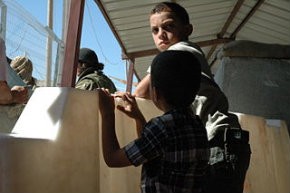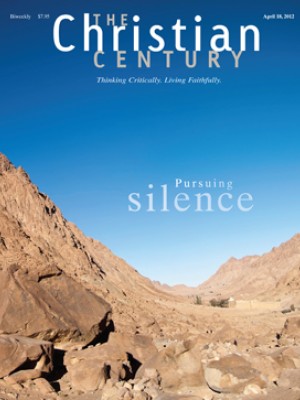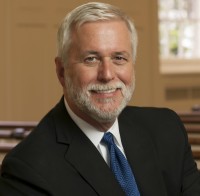Anxious in Palestine

Our bus stopped at a checkpoint, and Israeli soldiers boarded with M-16s slung over their shoulders. The soldiers couldn't have been older than 20. I sat quietly in my seat, held up my passport and wondered what it does to a young soul to be so familiar with a deadly weapon.
We were in the midst of a ten-day trip to visit the Christians in Palestine. Every couple of years I lead a group of seminarians and parishioners to visit what we call "the living stones" of the Palestinian church. Our purpose is not to enter the political fray between the Arabs and Israelis but to give encouragement to Palestinian Christians, who currently make up less than 2 percent of the population. But I have led these trips for 20 years, and I've found that it's impossible to disentangle faith from politics in this place. The deeper our relationships become with Palestinians, the more we have to grapple with the Israeli occupation as the source of their crisis.
Read our latest issue or browse back issues.
Along the way I remind myself that residents of the Holy Land have often struggled under occupying armies. This is a deeply engrained aspect of their understanding of holiness; they have searched for God through the centuries in a land marred by injustice. This becomes clearer when one listens to the Palestinians' stories.
Halfway through our journey we broke up into groups of two and three and stayed in the homes of the members of a village Catholic church in the West Bank. A young family hosted another seminary professor and me. The evening began with delightful stories and laughter. But after their five-year-old son went to bed, the harder stories emerged. The grandfather had been shot in the head by a stray bullet when Israeli soldiers drove into the village firing their weapons in the air. The grandmother has to pass three checkpoints to go to dialysis three times a week. The young mother is a refugee from Iraq. The father was imprisoned for four months when he was 15 and was often tortured. I have a 15-year-old in my own home, and at this point I started to go a bit crazy. Who tortures children?
Our hosts did the best they could to calm me down. They didn't blame the people of Israel for the deranged savagery of a prison guard, and they were critical of their own people's contributions to the current tensions. They weren't interested in blaming anyone. They just wanted to raise their son to have a better life. I could have been talking with a family in my Pittsburgh parish. Like most parents, the Palestinians worry about their children. Unlike us, however, they don't fret about drugs or drunk drivers. They worry that the young Israeli soldiers will use their M-16s.
When it was time to go to bed, they led me to the five-year-old son's bedroom, where I slept on the floor under a Spider-Man blanket. The walls of the room were decorated with large posters of other superheroes. It was clear that they wanted to inspire their son to grow up to be a hero. But as I lay on the floor staring at those posters, it occurred to me that if this boy becomes heroic later in life, his inspiration will not be Spider-Man. No, his future will be more influenced by parents who are determined that he'll have as normal a childhood as possible, one filled with love and imagination. And no guns.
The next morning we worshiped with the Catholic parish. Afterward we were treated to a presentation by young people performing traditional Palestinian dances. They looked happy. Cleary, the family that hosted me was not the only one that was working to create hope in its children. I was in awe of that resolve that persevered under the harsh conditions of daily life.
After leaving this humble village, we had to pass through another Israeli checkpoint before returning to our hotel in the West Bank. That is when the young Israeli soldiers boarded our bus with their M-16s. I prayed for their futures.
Then we drove through a gate in the 30-foot cement wall that separates the West Bank from Israel. I noticed the graffiti on the Palestinian side of the wall and was impressed by its creativity. Some of it was angry. A surprising amount of it was hopeful, and some of it was prophetic. A large white dove wearing a flack jacket seemed to proclaim that peace was in grave danger. But the graffiti that gripped my heart were a few hastily sprayed painted words: "I want my ball back."
There's the real danger to what we dare to think of as only a political problem. It is a great struggle for children on either side of the wall in Israel to be just children. I pray for their futures.






